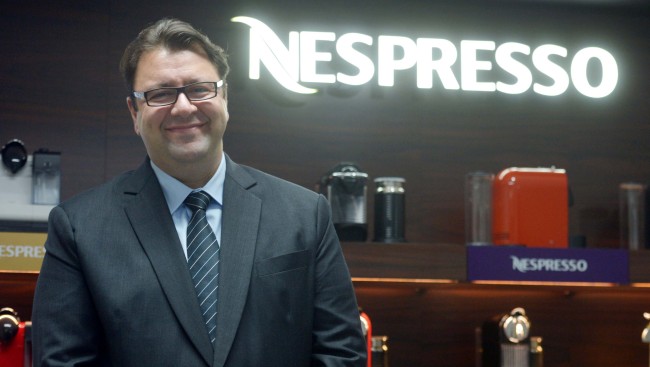 |
한국네스프레소 조지개롭 사장 (코리아헤럴드/ 김명섭 기자) |
<관련 영문 기사>
Nespresso sees coffee culture on the rise
Korean chief claims devotion to enriching local coffee culture
By Lee Ji-yoon
In Europe, most coffee is very short and very black, according to George Garrop, general manager at Nespresso Korea. But the regional chief, who was born in Greece and spent most of his life in Australia, says his favorite coffee now is a tall Americano because “it’s Korean style.”
“We are a global brand but we respect local consumers at the same time,” Garrop said in a recent interview with The Korea Herald. “Here, customers have very high expectations about the service too.”
Since its Korean launch in 2007, Nespresso, the premium coffee and coffeemaker brand owned by Swiss food giant Nestle, has enjoyed an almost unrivaled market share of 70 to 80 percent in the capsule coffee market.
According to industry data, sales of its machines soared from some 24,000 units in 2008 to 180,000 last year, though the Korean unit declined to reveal the exact figures.
“We help people have their coffee experience in a way that no other brand does. In doing so, we have no competitors,” said Garrop, who joined Nespresso Korea two years ago after leading the brand’s stunning growth in Australia.
Nespresso takes a unique marketing strategy operating its own boutique storefronts where customers can buy machines, capsules and accessories, sip coffee and taste the lifestyle.
Customers immediately become the brand’s club members so the company can track their purchase record and offer customized consultations.
The Korean unit owns 10 stores here, including the first Nespresso flagship boutique in Asia that opened in December last year in the posh area of Cheongdam-dong, southern Seoul.
“Last year, we opened five boutiques,” said Garrop. “This is a very large amount of investment from our headquarters. We have a long-term view about success in this market.”
He remembers he was pleasantly surprised when he first arrived in Korea to see how strong the coffee culture was. “I just do not mean lots of coffee shops, but coffee is really a part of Koreans’ life,” he said.
“I watched our customers at the boutique trying to smell the coffee, stir it, and sip it from the spoon,” he said. “It surprised me because I saw a very deep appreciation for coffee by consumers here.”
Some 20 different capsules marketed here also allow for a wide range of tastes, especially for Korean consumers who prefer coffee with water or milk over plain espresso.
Amid Nespresso’s growing presence in recent years, competition has grown fiercer among diverse coffee products, from coffee sticks and specialty coffee houses to capsule coffee machines.
“I think the overall coffee industry is very healthy and one clear trend is premiumization of coffee,” he said. “Korean consumers would like to have a higher level of coffee so we benefit from that.”
Garrop emphasized that Nespresso doesn’t just sell coffee, showing off its competitive and unique combination of high-quality coffee, innovative and well-designed machines, and personalized services.
That is one more reason why the chief showed no doubt about the brand’s strong growth here despite the recent slowing economy.
“We know the economy at the moment is little bit quiet. These are the times when maybe you might delay a big luxury purchase. But Nespresso is an affordable luxury and you will still buy it.”
(jylee@heraldcorp.com)
Intern reporter Choi In-jeong contributed to this report. --Ed.







